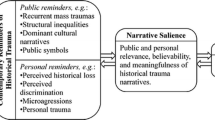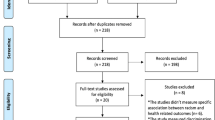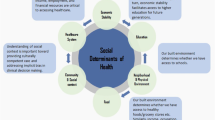Abstract
We investigate the Hispanic paradox by examining the relationship between acculturation and health status of Latinos to understand nuances among this growing heterogeneous population using a 2011 Latino Decisions survey. We find that acculturation remains an important determinant of Latino health; however, this varies based on whether the sample is restricted to immigrants or includes all Latino adults and on the measures of acculturation employed. We find Latino citizens reported better health than non-citizens; however, other acculturation measures, such as language use and time in the U.S. do not have a marked effect. Furthermore, skin color matters only for U.S.-born Latinos. Racialization is therefore important to consider within the context of the Hispanic paradox. Our findings suggest that some of the disadvantages stemming from minority status in the U.S. are more prominent among Latinos who have greater experience with the racial hierarchy of the U.S. and greater acculturation more broadly.
Similar content being viewed by others
References
Velasco-Mondragon E, Jimenez A, Palladino-Davis AG, Davis D, Escarmilla-Cejudo JA. Hispanic Health in the USA: a scoping review of the literature. Public Health Rev. 2016;37:31–58.
Smedley BD, Stith AY, Nelson AR. Unequal treatment: confronting racial and ethnic disparities in health care. Washington: National Academies Press; 2002.
Teruya SA, Bazargan-Hejazi S. The immigrant and Hispanic paradoxes: a systematic review of their predictions and effects. Hisp J Behav Sci. 2013;35:486–509.
Abraido-Lanza AF, Chao MT, Florez KR. Do healthy behaviors decline with greater acculturation? implications for the Latino mortality paradox. Soc Sci Med. 2005;6:1243–55.
Franzini L, Ribble JC, Keddie AM. Understanding the Hispanic paradox. Ethn Dis. 2001;11:496–518.
Lara M, Gamboa C, Kahramanian MI. Acculturation and Latino health in the United States: a review of the literature and its sociopolitical context. Annu Rev Public Health. 2005;26:367–97.
Gubernskaya Z. Immigrant (self-rated) health paradox? ethnic differences in the effects of nativity on self rated health. Irvine: University of California Press; 2010.
Okie S. Immigrants and health care—at the intersection of two broken systems. N Engl J Med. 2007;357:525–9.
Zuckerman S, Waidmann TA, Lawton E. Undocumented immigrants, left out of health reform, likely to continue to grow as share of the uninsured. Health Aff. 2011;30:1997–2004.
Echeverria SE, Carrasquillo O. The roles of citizenship status, acculturation, and health insurance in breast and cervical cancer screening among immigrant women. Med Care 2006;44:788–92.
Campbell K, Garcia DM, Granillo CV, Chavez DV. Exploring the Latino paradox: how economic and citizenship status impact health. Hisp J Behav Sci. 2012;34:187–207.
Gordon M. Assimilation in America. Theory and Reality. In: Aguirre A, Baker F, editors. Notable selections in race and ethnicity. Guildford: Dushkin; 1995. pp. 91–101.
Berry JW. Conceptual approaches to acculturation. In: Chun KM, Organista PB, Martin G, editors. Acculturation: advances in theory, measurement and applied research. Washington, DC: American Psychological Association; 2003. pp. 17–37.
Ruiz JM, Steffen P, Smith TB. Hispanic mortality paradox: a systematic review and meta-analysis of the longitudinal literature. Am J Public Health. 2012;103:e52–e60.
Martın G. Issues in the measurement of acculturation among Hispanics. In: Geisinger KF, editor. Psychological testing of Hispanics. Washington, DC: American Psychological Association; 1992. pp. 23–51.
Portes A, Rumbaut RG. Immigrant America: a portrait. 3rd ed. Berkeley: University of California Press; 2006.
Schur CL, Albers LA. Language, socio-demographics, and health care use of Hispanic adults. J Health Care Poor Underserved. 1996;7(2):140–58.
Zhang W, Hong S, Takeuchi DT, Mossakowski KN. Limited English proficiency and psychological distress among Latinos and Asian Americans. Soc Sci Med. 2012;75:1006–14.
Thomson EF, Nuru-Jeter A, Richardson D, Raza F, Minkler M. The Hispanic paradoc and older adults’ disabilities: is there a healthy migrant effect? Int J Environ Res Public Health. 2013;10:1786–814.
Monforti JL, Sanchez GR. The politics of perception: an investigation of the presence and sources of perceptions of internal discrimination among Latinos. Soc Sci Q. 2010;91:245–65.
Massey DS, Denton NA. Residential segregation of Mexicans, Puerto Ricans, and Cubans in U.S. metropolitan areas. Sociol Soc Res. 1989;73:73–83.
Krieger N. Embodying inequality: a review of concepts, measures, and methods for studying health consequences of discrimination. Int J Health Serv. 1999;29:295–352.
Viruelle Fuentes EA, Moranda PY, Abdulraham S. More than culture: structural racism, intersectionality theory, and immigration health. Soc Sci Med. 2012;75:2099–106.
Sanchez GR, Espinosa PR. Does the race of the discrimination agent in Latino’s discrimination experiences influence Latino group identity? Sociol Race Ethn. 2016;2:531–47.
Garcia JA, Sanchez GR, Sanchez-Youngman S, Vargas ED. Race as lived experience: the impact of multi-dimensional measures of race/ethnicity on the self-reported health status of Latinos. Du Bois Rev. 2015;12:349–73.
Gómez C. The continual significance of skin color: an exploratory Study of Latinos in the Northeast. Hisp J Behav Sci. 2000;22:94–103.
Klonoff EA, Landrine H. Is skin color a marker for racial discrimination? explaining the skin color–hypertension relationship. J Behav Med. 2000;23:329–38.
Hersch J. Skin color, immigrant wages, and discrimination. In Hall RE, editor. Racism in the 21st century: an empirical analysis of skin color. Springer; 2008. pp. 77–90.
Garcia J, Sanchez GR, Vargas E, Winston N. Latino or Mexicano?: the relationship between socially assigned race and experiences with discrimination. Sociol Race Ethn. 2016;2(4):498–515.
Nelson DE, Holtzman D, Bolen J, Stanwyck CA, Mack KA. Reliability and validity of measures from the Behavioral Risk Factor Surveillance System (BRFSS). Soc. Prev. Med. 2001;46:S03–S42.
Idler EL, Benyamini Y. Self-rated health and mortality: a review of twenty-seven community studies. JHSB. 1997;38:21–37.
Rubin RR, Peyrot M. Quality of life and diabetes. Diabetes Metab Res Rev. 1999;15:205–18.
Tsai J, Ford ES, Chaoyang L, Guixiang Z, Balluz LS. Physical activity with optimal self rated health of adults with and without diabetes. BMC Public Health. 2010;10:365–74.
Sanchez GR, Vargas ED. Language bias and self-rated health status among the Latino population: evidence for the influence of translation in a wording experiment. Qual Life Res. 2016;25:1131–6.
Fraga LR, Garcia JA, Hero R, Jones-Correa M, Martinez-Ebers V, Segura GM. In: Latino National Survey (LNS) ICPSR20862-v6. Ann Arbor: Inter-University Consortium for Political and Social Research; 2006.
Hayes J, Hill L. Immigrant pathways to legal permanent residence: now and under a merit-based system. Public Policy Inst Calif. 2008;9:1–5.
Akresh IR. Health service and hospital usage patterns among immigrants to the United States. Popul Res Policy Rev. 2009;28:795–816.
Hersch J. The persistence of skin color discrimination for immigrants. Soc Sci Res. 2011;40:1337–49.
Cabassa LJ. Measuring acculturation: where we are and where we need to go. J Behav Sci. 2005;25:127–46.
Funding
This study was not grant funded, but primary author was supported through the Robert Wood Jonson Center for Health Policy Doctoral Fellowship.
Author information
Authors and Affiliations
Corresponding author
Ethics declarations
Conflict of interest
The authors declare that they have no conflict of interest.
Ethical Approval
This article does not contain any studies with human participants performed by any of the authors. The study utilized de-identified secondary data. IRB considered this study to be exempt.
Appendix
Appendix
See Table 3.
Rights and permissions
About this article
Cite this article
Vasquez Guzman, C.E., Sanchez, G.R. The Impact of Acculturation and Racialization on Self-Rated Health Status Among U.S. Latinos. J Immigrant Minority Health 21, 129–135 (2019). https://doi.org/10.1007/s10903-018-0696-7
Published:
Issue Date:
DOI: https://doi.org/10.1007/s10903-018-0696-7




